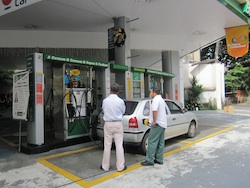This month, Brazil has resumed exporting ethanol to the United States, at the same time the country is struggling to meet its own country’s demand for ethanol to fuel is flex fuel vehicles (FFVs). Ethanol producers in the country have expanded exponentially – there are more than 115 ethanol plants many of which have come online since 2005. However, despite massive investments by foreign companies into the country’s biofuels industry, nary a five new ethanol plants are expected to come online the remainder of this year.
 Some may remember that last year due to a decreased sugarcane harvest caused by excessive rains, the country reduced its minimum ethanol requirements in the country’s fuel. Then this year, threat of another reduction circulated when once again the sugarcane harvest was lower than expected. In response, the government has cited ethanol shortages due to poor long-term strategic planning by the industry. The ethanol industry countered that the cause of problems lies in lack of uneven taxes, vague plans for future regulation and lack of investment incentives.
Some may remember that last year due to a decreased sugarcane harvest caused by excessive rains, the country reduced its minimum ethanol requirements in the country’s fuel. Then this year, threat of another reduction circulated when once again the sugarcane harvest was lower than expected. In response, the government has cited ethanol shortages due to poor long-term strategic planning by the industry. The ethanol industry countered that the cause of problems lies in lack of uneven taxes, vague plans for future regulation and lack of investment incentives.
“As long as there is no clarity about the policy for fuels, there is a risk for investments,” said the president of Sao Paulo-based Datagro consultants, Plinio Nastari in a Reuters article.
Yet on the flip side of this bickering between the Brazilian government and Brazilian ethanol producers, the industry has once again begun exporting fuel to the U.S. over the past few months. According to brokers quoted in a recent Soyatech article, the ethanol industry has exported 1.9 million barrels to the U.S. as a result of fuel retailers needing to meet the requirements of the Renewable Fuels Standard.
Brazilian sugarcane ethanol has been considered an advanced biofuel as designated by the U.S. Environmental Protection Agency (EPA). Since there is a shortage of advanced biofuels being produced in the U.S., sugarcane ethanol has become a premium fuel for the obligated parties. Ironically, the exportation of ethanol was an abrupt change as earlier this year Brazil imported ethanol to meet its country’s mandates – the first time since 1994.
 While all this is happening, Brazil’s national petroleum agency, ANP, unveiled new plans aimed at tightening government regulation over the ethanol market and avoid the recent ethanol supply volatility that has been plaguing the country. Ultimately, ANP’s regulations would level out the amount of ethanol producers and distributors market throughout the year and mandate companies to have minimum stocks of ethanol available at all times.
While all this is happening, Brazil’s national petroleum agency, ANP, unveiled new plans aimed at tightening government regulation over the ethanol market and avoid the recent ethanol supply volatility that has been plaguing the country. Ultimately, ANP’s regulations would level out the amount of ethanol producers and distributors market throughout the year and mandate companies to have minimum stocks of ethanol available at all times.
To aid the industry in meeting both anticipated ANP regulations as well as meet import demand, Brazil’s state-run bank, BNDES, has committed to providing $19-$22 billion in funds to finance sugar cane industry expansions through 2014. The monies represent nearly two-thirds of the industry’s current yearly output.
The country will have to develop plans to expand the industry with special emphasis on sustainability. The country is often cited by biofuel critics, especially environmental organizations, as a environmental disaster waiting to happen due to accusations that the ethanol industry is expanding through the destruction of precious rainforests.
Needless to say, the Brazilian ethanol industry has denied these accusations, and during the same Ethanol Summit where mud was being flung between groups, UNICA, the Brazilian Sugarcane Industry Association, launched a new website dedicated to sugarcane ethanol, www.SugarCane.org. The website is designed to showcase how sugarcane can contribute to pressing global issues such as energy and environmental needs and also lays out strategies to do this in an environmentally friendly and sustainable way.

